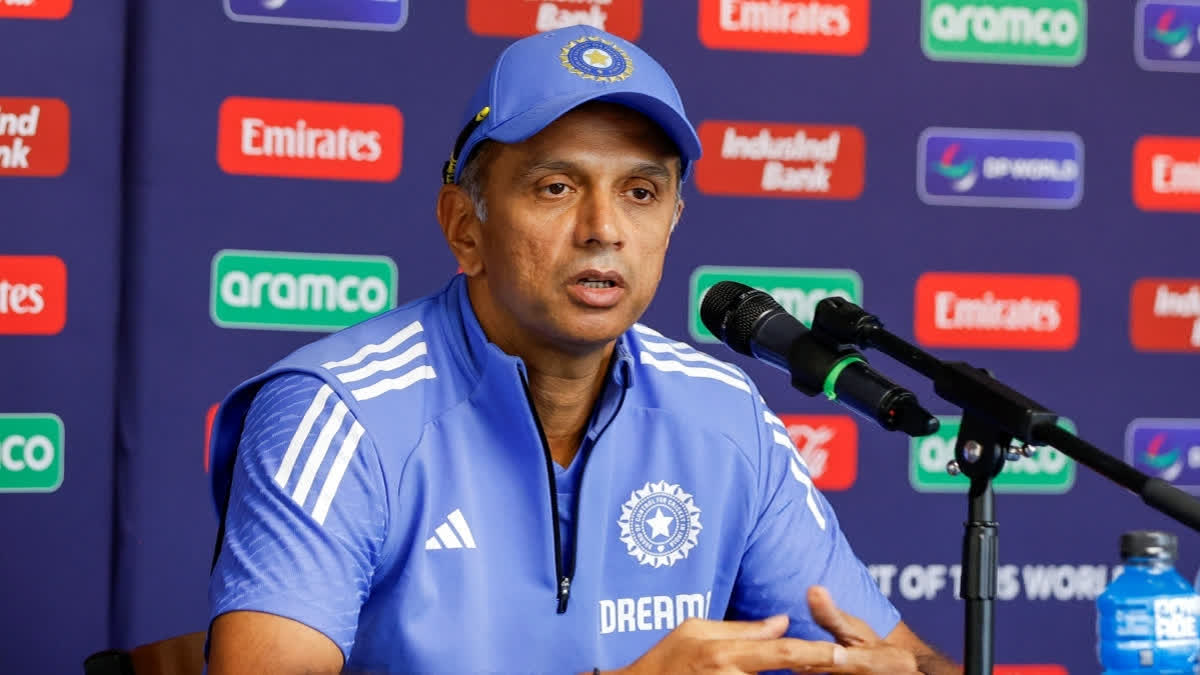Bridgetown (Barbados): On a pitch that has the propensity to both bounce and turn, India may bring in Kuldeep Yadav or Yuzvendra Chahal into play at the Kensington Oval when they open their account for the Super Eights against Afghanistan on June 20.
In New York, “we wanted to ensure that we had the depth on those tricky wickets. Here, without giving too much away, certainly it might be slightly different, and we might feel the need (for) an extra spinner. Then certainly someone like Kuldeep or Yuzi with their quality and their skill do come into play and become big factors for us,” head coach Rahul Dravid said in the pre-match press conference.
This will be the first match Team India will play in the Caribbean with just two days of practice but coach Dravid is confident that the outing will be good. “We are ready, rested and prepared,” he said.
The match against Afghanistan will be crucial and quite a test as Dravid felt that “Afghanistan is a very dangerous team in this format of the game.”
Rashid Khan’s men, he said, may not have a lot of international experience in other formats of the game. “But a lot of their players do play in a lot of T20 leagues, more than in fact some of our players do. They are well-travelled cricketers, especially in the T20 circuit and T20 league. They are prominent members of IPL teams. So, in this format they are not a team to be taken lightly,” Dravid said.
Talking about the morning T20 games which is unusual for most players who have always played this shortest format under the lights, Dravid conceded that today’s generation don't play a lot of games at 10:30 am.
“But I don't think it's a hassle. Once you get used to it, once you get your mind around it, as we have… there are some, factors like the dew will not be a factor. But there are other things which you might consider like the slowness of the pitch in a day game. Other than some tactical adjustments, it doesn't really make too much of a difference,” he added.
Dravid said conditions govern the batting order which makes it essentially flexible. “Each situation is unique. I believe in being flexible in thinking and being able to adapt to situations. What does your team require? What do the conditions require? We've always been conscious of it. It's something we've continuously striven to do. For the Pakistan game, we moved Axar (Patel) up the order. There was a specific thinking around it. There are other situations where we have moved Rishabh a little bit up the order in this thing. So, there's been a little bit of thinking around that,” he explained.
Dravid was captain of the 2007 Indian team that lost to Bangladesh in the World Cup to return home from the Group stages. Dravid does not want to be reminded of that, especially as head coach of the team which will be playing newbie teams like Afghanistan and, of course, Bangladesh in its quest for the semi-final.
“Jeez, thanks a lot buddy. Had some other decent memories also in life. God man, I'm not trying to make new anything. I move on from things very quickly. That's one of my things. I do what I am doing now at the moment. I am not concerned about what happened in some other year. Just move on. Focus on tomorrow. Prepare the team as best as we can,” he said.
Dravid also said that cricket is one of the very few games in the world that is governed by extraneous conditions.
“While dew may not be a factor, maybe the wind could be a factor in this place. The wind blows quite strongly from one side to the other. The boundary sizes might be smaller on one side, bigger on one side. There's a bit of a slope. It's probably a quicker outfield than what we experienced in New York. So, we'll have to adjust, we'll have to adapt. We've discussed these things in fruitful meetings over the last couple of days,” he said.
Team and management chats have kept Dravid happy as there's been a generous exchange of intelligence, conversations and ideas “Hopefully, we can now execute some things,” he said.
Talking about the emphasis on batting, Dravid said that’s been the case over the last few years – our stats and numbers show we have pushed the needle forward in terms of our batting,” he conceded.
He cautioned again getting carried away in T20 cricket. “But then, cricket is a very condition-specific game. It's one of the only sports left where the surface makes such an impact on the actual skill levels, the actual performance levels. It's one sport that we play where the surface makes a huge difference, and it has to be brought into consideration at all times. That's something we pride ourselves in. We are trying to get that ability to be smart in decision making, in assessing situations cleverly,” he said.
The study of the conditions is crucial to match outcomes and in the run-up to the game tomorrow, the coach and his team have looked closely at the ground, past results, past scores on this ground, the level of swing, amount of turn and what's the bounds. “You might have all the stats, all the data, but on the day, conditions can be very different,” he said, adding that “the preparation of a wicket, the weather, so much can change.”



